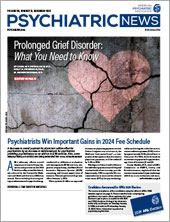In the fall of 2021, I was scrolling through my Twitter feed when I came across “APA/APAF Fellow” in a resident physician’s profile biography. I decided to investigate what this meant and found my way onto APA’s website and the resource section for residents and fellows. There it was‐an area titled “fellowships.” (APAF stands for APA Foundation.)
For as long as I can remember, I have always looked for learning opportunities. The more I read about the
APA/APAF fellowships, the more I realized they represented an opportunity to develop further as a psychiatry trainee. I carefully read through the descriptions of each fellowship and found two that interested me. I applied to both and was over the moon when I received acceptance emails. I chose the APA/APAF Leadership Fellowship. I knew that many leaders in psychiatry had completed this fellowship‐namely, one of my mentors, Dr. Saul Levin, CEO and medical director of APA, and Dr. Rebecca Brendel, immediate past president of APA.
To say I was thrilled about my acceptance is an understatement. The purpose of the APA/APAF Leadership Fellowship is to develop national leaders in organized psychiatry by offering psychiatry trainees opportunities to interact with national thought leaders in the field and to further develop their professional leadership skills, networks, and psychiatric experiences. It also allows fellows the opportunity to expand relationships with peers and connect with mentors who are involved in APA. In addition, fellows have an opportunity to gain an understanding of APA’s and APAF’s governance through service on an APA council, APA committee, or APA Foundation program. Individuals who are elected chair of the Leadership Fellowship serve on the APA Board of Trustees as a nonvoting member.
Since I began the fellowship, I had hoped to become its chair. I started working on that goal by becoming the fellowship’s co-chief of education, which gave me the opportunity to create programming by building and utilizing my network of psychiatrist speakers to further our growth as leaders in psychiatry. I was also appointed to the APA council that was my first choice—the Council on Communications. It was an overwhelmingly exciting time to become connected.
Fast forward one year into the fellowship, and I am honored to share that I am now the chair of the Leadership Fellowship. This came with the opportunity to “take over” APA’s social media Instagram channel for one day at the Annual Meeting in May, during which I shared a day in the life of an APA/APAF Leadership Fellow. In addition, so far, I have participated in my first APA Board of Trustees meeting, held an election for the fellowship’s executive committee of officers, and submitted abstracts for APA’s 2024 Annual Meeting in New York City. Recently, all fellows attended the APA Fall Components Meeting, where we participated in fellow-specific programming and met with our respective components in person.
The fellowship has offered other benefits. I have made new friends who are now colleagues, I have found new mentors to add to my network, and I have created memories that will last a lifetime. I truly feel that these experiences have provided me with insight on how I can play a leadership role in psychiatry and do my part to ensure equitable, high-quality psychiatric care to all those who need it. ■

